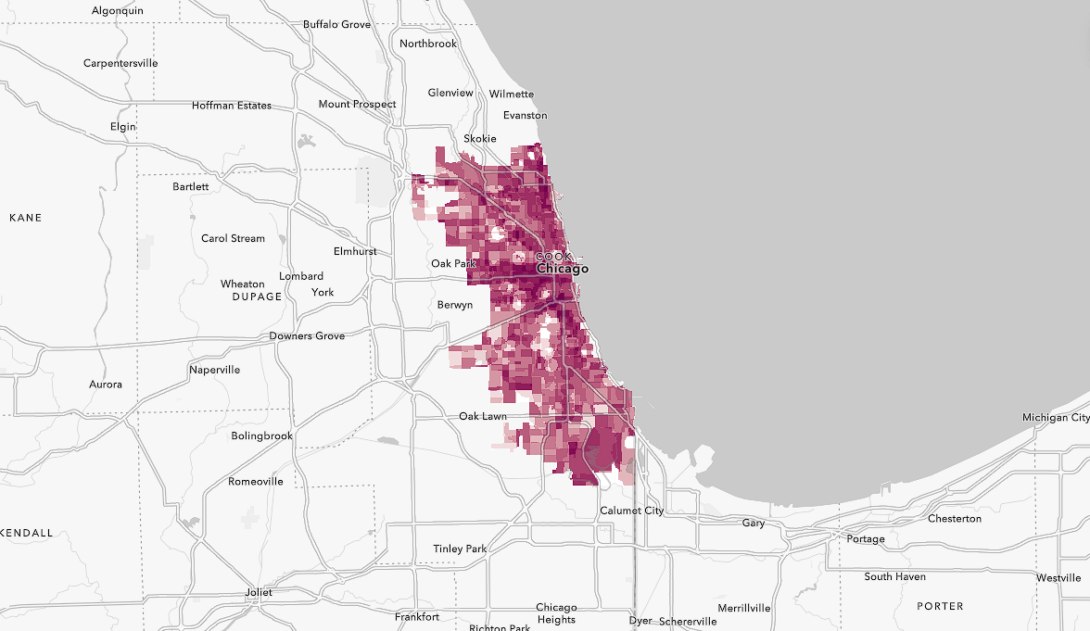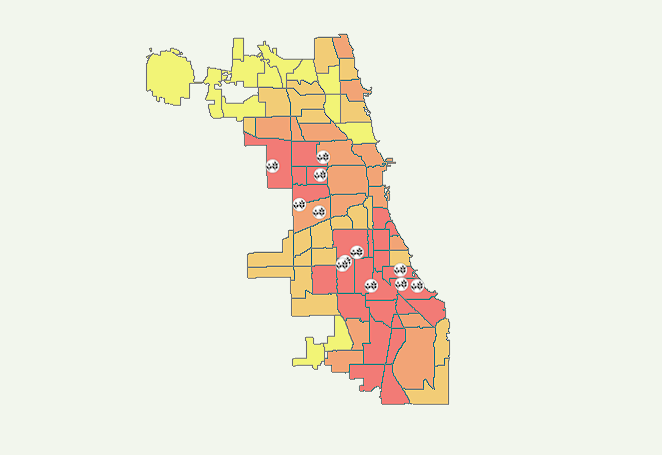UPP 461 | Fall 2023
Final Project Showcase
In Fall 2023, the UPP461 class produced team and individual projects on various topics. Teams have several weeks in the second half of the semester to develop research questions, investigate the topic of interest, explore GIS tools to address their questions and produce the final visuals. Students were encouraged to use multiple analytical techniques/tools covered in the course (e.g., geoprocessing tools such as buffer, clip, and intersect, geocoding, work with rasters, table and spatial joins, etc.), as well as good use of symbology, labeling, color selection, map projection, and layout design. The final result includes an ArcGIS StoryMap report where maps and additional information illustrate methods and communicate findings. Thanks to all the students for your hard work during the semester.
Instructor - Andrea Craft
1. Chicago's Community Fridges Heading link

Authors: Gwen McCain, Cassie Varrige, and Addie Wasikonis
This project was centered around combating food insecurity in Chicago by implementing community fridges, which served as essential hubs for providing free access to food for individuals and families facing hunger. Completed through meticulous research, the initiative identified and verified existing fridge locations while conducting extensive qualitative analysis to determine success factors. Utilizing GIS technology, a suitability index was developed to identify potential locations for future installations based on need, access, and community support. Spearheaded by organizations like Love Fridge and Veggie Mijas, these community-driven initiatives fostered food justice and accessibility, particularly in marginalized communities. Despite acknowledging challenges such as the decentralized nature of mutual aid networks and the influence of non-geospatial factors on fridge success, the project offered valuable insights and resources for grassroots organizations seeking to expand their impact in combating hunger and promoting community resilience. Future collaborative efforts and continued data-driven analysis could empower communities in their fight against food insecurity and inequity.
2. Community Gardens and Violent Crime in Chicago Heading link

Authors: Marjorie Kersten, Ezra Wright, Nicolas Tantely Raoilmanantsoa
This project delved into the persistent issue of violent crime in the United States despite a significant decline over the past few decades, juxtaposing it with markedly higher rates compared to other high-income countries. This disparity underscored the urgency of addressing violent crime, particularly in marginalized communities where it disproportionately affected non-white and low-income individuals, contributing to various adverse health outcomes. To mitigate these effects, the project explored interventions such as increasing access to maintained green spaces, yet the impact of community gardens on crime in Chicago remained understudied. Utilizing ArcGIS Pro, the study investigated the relationship between establishing community gardens between 2010 and 2016 and their potential influence on violent crime in Chicago. The methodology involved mapping garden locations within neighborhoods exhibiting higher poverty and unemployment rates and social vulnerability indices alongside crime data from two years before and one year after each garden’s establishment. While the analysis provided new insights into this relationship, challenges, including data cleaning complexities and limitations in crime data availability, underscored the need for cautious interpretation and suggested avenues for future research to delve deeper into statistical analyses and refine garden selection criteria.